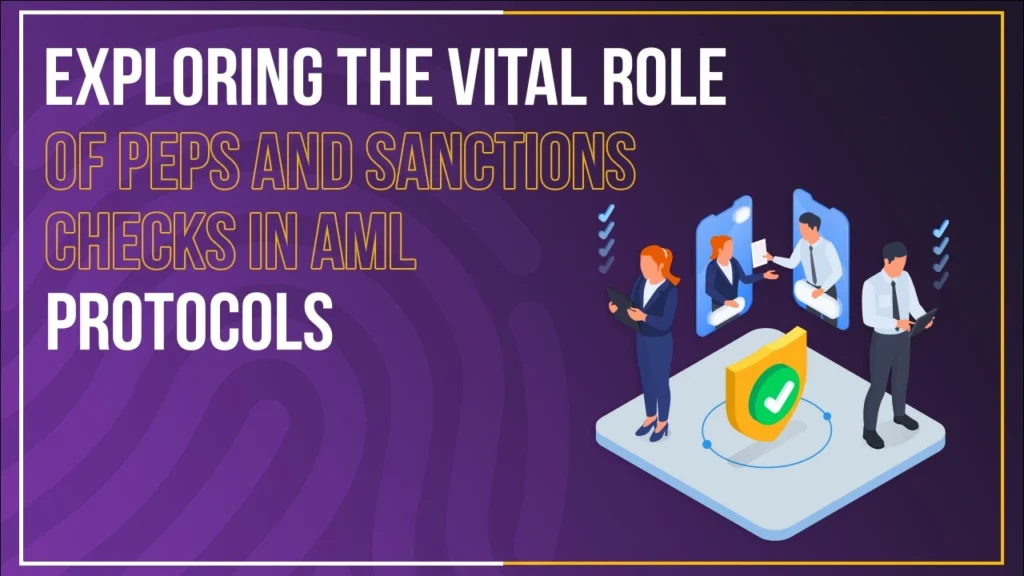Protecting from money laundering, terrorist funding, and other criminal activities is still a key responsibility for organisations globally in the constantly changing world of financial transactions. Organisations are using cutting-edge tools and technologies to strengthen their anti-money laundering (AML) operations as regulatory requirements become more stringent. PEP (Politically Exposed Person) and sanctions checks are two of these techniques that are essential for detecting and reducing any threats. We'll go into the nuances of PEPs screening, examine the importance of sanctions filtering and PEP in AML compliance, and emphasise how Idenfo Direct's name screening and authentication services support AML defences.
Understanding PEPs and sanctions checks
So what are PEPs and sanctions screening? First of all, PEPs are those who are closely associated with influential politicians or who occupy significant public roles. PEPs may be more likely to be engaged in financial offences such as corrupt acts or bribery because of their powerful positions. To reduce possible hazards, financial institutions and companies must perform expanded due diligence on PEPs.
Conversely, sanctions are actions taken by governments or international organisations to limit or forbid particular actions, exchanges, or interactions with particular nations, organisations, or people. Human rights abuses, perceived risks to national security, or other geopolitical issues are frequently the reasons behind the imposition of these sanctions. Companies must abide by penalties legislation to prevent legal issues and harm to their credibility.
The Importance of PEPs and sanctions screening:
Sanctions and PEPs screening are essential parts of AML compliance programmes that assist businesses in spotting and stopping illegal financial activity. Businesses can reduce the chance of unintentionally aiding in money laundering or terrorist financing by thoroughly screening their counterparties and clients. Furthermore, PEPs and sanctions screening allow organisations to show that they are dedicated to adhering to regulations and maintaining the reliability of the banking system.
PEPs screening process:
PEPs screening is determining if people or companies are PEP-eligible and evaluating the dangers involved. Usually, the procedure entails the following steps:
1. Identification: Companies gather pertinent data, such as identities, dates of birth, and other identifying characteristics, about their counterparts or clients.
2. Screening: Organisations compare the gathered data to listings of suspected or identified PEPs kept by regulatory bodies or outside suppliers using specific PEP screening technologies or databases.
3. Danger Assessment: Based on variables such as a person's position, jurisdiction, and previous behaviour, organisations assess the degree of danger attached to those who have been designated as PEPs. To successfully manage possible dangers, higher-risk PEPs may be subject to enhanced due diligence requirements.
How Idenfo Direct's name screening and identity verification services help
1. Name Screening: With the use of Idenfo Direct's name screening technology, businesses may effectively check counterparties and clients against international PEP and sanctions lists. Idenfo Direct gives businesses the ability to swiftly discover potential hazards and take necessary steps to reduce them with its customisable risk assessment models and real-time monitoring features.
2. Identity verification: Idenfo Direct offers thorough identity verification services in addition to name screening, enabling businesses to confidently confirm the identities of counterparties and consumers. Idenfo Direct assists companies in confirming the legitimacy of client identities and preventing identity theft by utilising cutting-edge biometric authentication, document verification, and liveness detection technology.
3. Conformity monitoring: Organisations can create full reports on their PEP and sanctions screening efforts with the help of Idenfo Direct's powerful compliance backed features. Businesses can show their dedication to regulatory compliance and openness by displaying these reports, which offer perspectives on screened results, compliance with regulations, and potential hazards.
4. Expert support: Idenfo Direct offers firms professional advice and assistance in putting in place successful AML compliance programmes thanks to its cutting-edge AML and regulatory compliance solutions. Idenfo Direct assists companies in staying ahead of new regulations and developing dangers.
To sum up, PEPs and sanctions checks are essential to AML compliance because they assist businesses in identifying and reducing risks related to money laundering, financing of terrorism, and other illegal activity. Organisations may strengthen their AML defences, show that they are committed to regulatory compliance, and preserve the reliability of the banking system by utilising sophisticated name screening and identity verification services, such as those provided by Idenfo Direct. Investment in strong AML services is crucial for organisations to successfully traverse the complicated environment of money laundering preventative measures, as laws and regulations continue to change.









